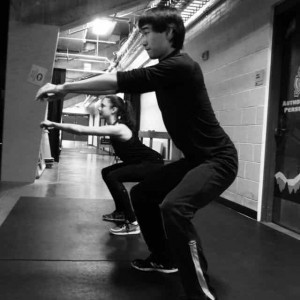More ICETough Tips
If want more awesome information, join to our ICETough Community and receive bonus tips! About once a week.
Part 2: Temporarily Grounded
A pessimist sees the difficulty in every opportunity;
an optimist sees the opportunity in every difficulty.
–Winston Churchill
 In Part 1 of this three part article, Dealing with Frustration: Opportunity Knocks , I talked about your choices when faced with an interruption in your training routine.
In Part 1 of this three part article, Dealing with Frustration: Opportunity Knocks , I talked about your choices when faced with an interruption in your training routine.
In this article (Part 2 of this series), we will talk about what you can do off the ice while you are waiting for your boots to come in. Part 3 will suggest how to use the time to build your Mental Game.
You can get frustrated and play video games or watch movies until your skates come in, or you can decide to make “Lemonade out of Lemons”.
Athletes with a strong Mental Game know to “Focus on what they can control.” If you have chosen to see opportunity in this disappointment, read on.
If you are new to skating, you might not realize that when a skater is committed to competing at a high level what you see them do on the ice is just a fraction of their total training. Skaters need to do off ice dryland training, off ice program work as well as conditioning and flexibility. Dance or movement also enhance the execution of on-ice skills.
If you already do all of these things, then you can use the extra time to address weaknesses in smaller muscle groups. Work on areas that your coach wants you to improve, you know those things that they repeat over and over each session such as expression, body lines and extensions. If you usually don’t have much time for off ice support work, this is a great time to get that going.
Use this time to build on your strengths and strengthen your weaknesses.
If you usually skate 2-3 hours five times a week, that is a lot of time to improve! When you get back on the ice, you will be a much improved skater.
You can ask your coach and your support team to advise you on things to work on that are directly skating related. They might also have a preference on some of the other supplemental activities not specifically related to skating, so make sure that you have their okay before you jump into something that might prove controversial.
Here are a few suggestions to get you started brainstorming. But don’t take too long to decide, your new skates will be here before you know it!
- Off ice Jumps- if you have an off ice harness at your facility, this is a great opportunity to work with your coach on jump technique off the ice.
- Walk through your jumps in slow motion
- Dryland jump technique
- Program run throughs focusing on expression, extension
- Core strengthening
- Conditioning for your body
- Pre-habilitation-get a functional movement screening at trusted Physical Therapist or Sports Specialty facility. Find your muscle imbalances and work your program to strengthen and balance your body.
- Study videos of skaters, study videos of yourself skating to see what you can improve
- Catch up and get ahead on your school work
- Work on your Mental Game-see Part 3 Training Interruptions: When Opportunity Knocks
“Men’s best successes come after their disappointments.”
-Henry Ward Beecher.
I have worked with many skaters and have been around skating for a very long time, and I know that this strategy works! Skaters who adopt a “can do” attitude continue to improve even while off the ice, while skaters who complain and do nothing end up playing “catch up.” It’s your choice.
Next up: Training Interruptions: When Opportunity Knocks
Part 3 Working on your Mental Game
Part 1 Dealing with Frustration: Opportunity Knocks
Mental skills training can help to keep your emotions on an even keel so that you can practice and compete your best.
Start here; download “Confidence Myth Busters,” a complimentary eBook and make a change.
